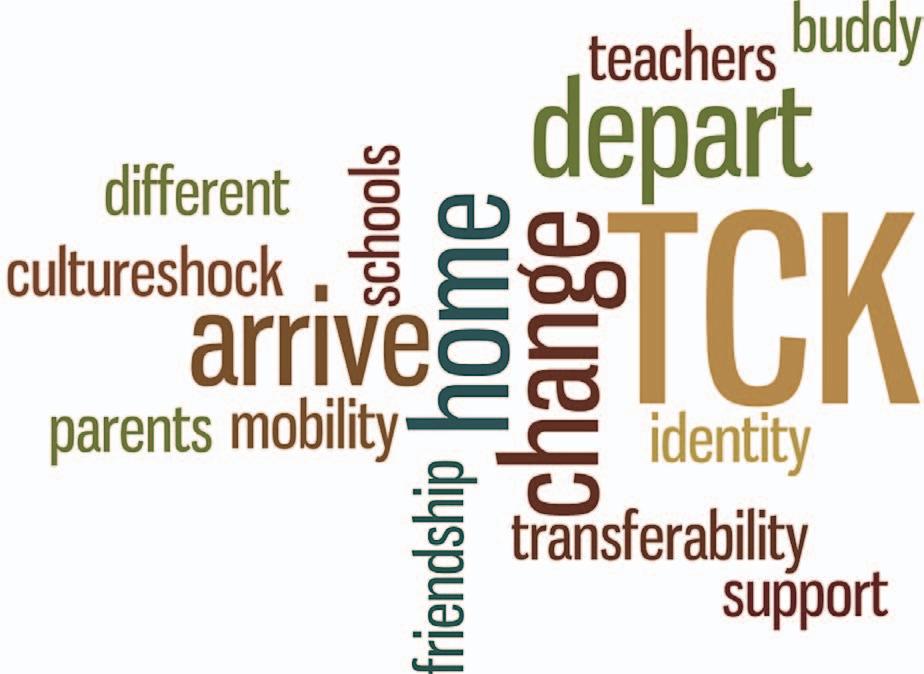Fifth column
Is there life beyond ‘TCK’? E T Ranger has been doing some fieldwork...
Can the TCK model be applied to refugees, or to economic migrants, or committed cosmopolitans? by values, or in the international field of business and politics, where communities are defined by borders and passports? It is the latter that we almost invariably think of in our schools, where we tot up our number of nations with pride. Yet at ‘home’, and throughout the world, the daily problem is the difference in values between two individuals. It sounds as though we could learn from those who stayed home. Our editors have suggested that we look again at the label ‘TCK’. If we think about diversity in terms of the 244 million people who the UN said in 2015 were living outside their country of birth, how useful is the term ‘TCK’? Devised to provide a category for those who travelled abroad at a time when few did, and returned to find themselves unexpectedly out of synch with everyday life, that seems a very specific journey. Imagine the many kinds of cultural
44
encounters the ‘millennials’ will have in their lifetimes, even if Brexit, wall-building, and insidious nationalism continue. Can the TCK model be applied to refugees, or to economic migrants, or committed cosmopolitans? There is an additional reason to revisit the term and its consequences for practice. There is currently a major reassessment ongoing of some of the fundamentals of Social Psychology, among other subjects. Called the ‘Replication Movement’, it is a systematic re-examination of the methods, statistics and conclusions of research, and of the ‘researchbased’ remedies that have been marketed as a result. The rumble of collapsing theories and reputations keeps academics and consultants awake at night. Part of this is due to improved statistical methods. Researchers are not all statisticians and, to be honest, most research is a search for confirmation of the researchers’ hunches. Many investigations in Social Psychology only produce evidence of fractional effects. But this can generate a headline (or a tweet), then a miracle method, and a reputation is made. In the present climate it is a matter of time before our current theoretical assumptions are put under the microscope, and the TCK paradigm may be one of them. It’s not so much that they aren’t true – generalisations are a good place to start – but rather that we need a richer account of human development if we are to understand our complex reactions to such diverse situations. If we want to find some solid ground as research comes under criticism, where can we look? A hundred years ago Gregor Mendel’s statistical method was challenged by Ronald Fisher, and the question is still simmering (Franklin et al, 2008). John Berry, the Canadian authority on integration of immigrants who is a consultant to several governments, is clear about what is needed. Research in just one community cannot hope to be widely valid, he says. He has just published a 17-country study of the intercultural relation of communities which suggests that there is reliable validity in three social processes (Berry, 2017). Multiculturalism promotes the mutual respect and understanding of communities; Contact Theory predicts conditions in which genuine engagement with another community will generate understanding; integration promotes stability in societies where both the host and home cultures are sustained. Is this a place to start looking for a new formula to bring to the study of people who move? References Berry, J. W. (ed) (2017) Mutual Intercultural Relations, Cambridge: Cambridge University Press Franklin, A. (2008) The Mendel-Fisher controversy: an overview, in A. Franklin, A. W. F. Edwards, D. J. Fairbanks, D. L. Hartl (eds) Ending the Mendel-Fisher Controversy. Pittsburgh: University of Pittsburgh Press [pp 1-77]
Spring |
Autumn
Ever eager to know the word on the street, in October 2017 your correspondent joined the Alliance for International Education conference in Amsterdam, a biennial gathering of many parties to international education. As a group of educators, academics, examiners, parents – and in some cases grandparents, it offers a formidable concentration of international and intercultural experiences, and triggers some rich discussions. One grandparent claimed that a grandchild in a primary school in a British city has more access to the ordinary homes and lives of other communities than another grandchild who attends an international school. Reflecting on the homes that an international school bus is likely to call at, this seems very possible. Perhaps we globe-trotters are aware of one kind of diversity – nationality – and blind to others – heritage, class, personal history. Does this matter? To some extent it depends where we see the child’s mobile future being played out: in a ‘home country’, where host and immigrant communities are divided
| 2018



















